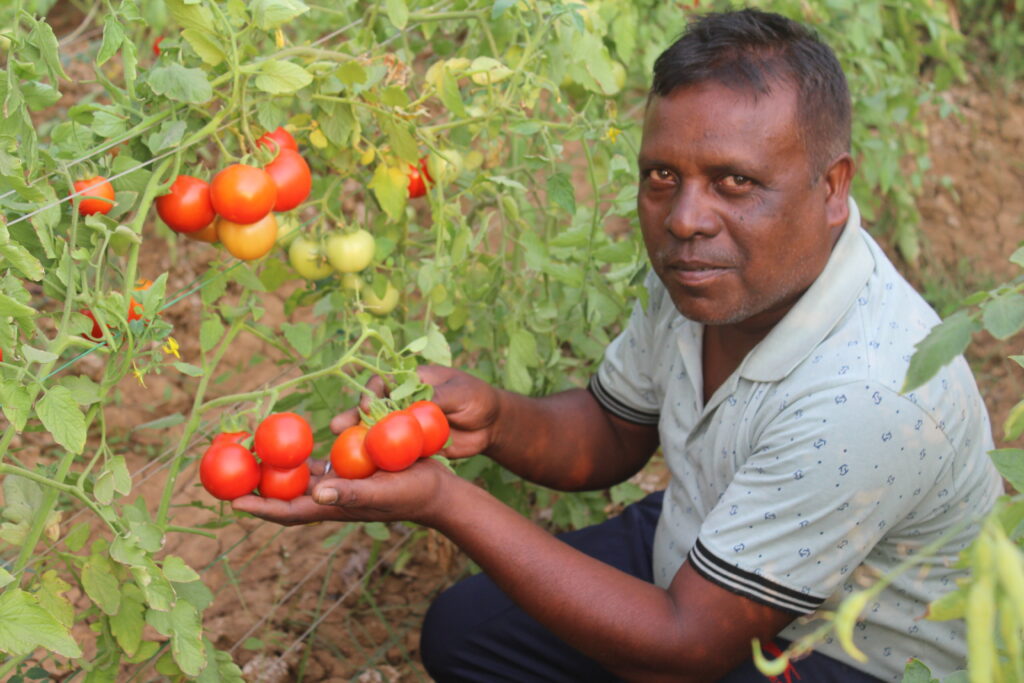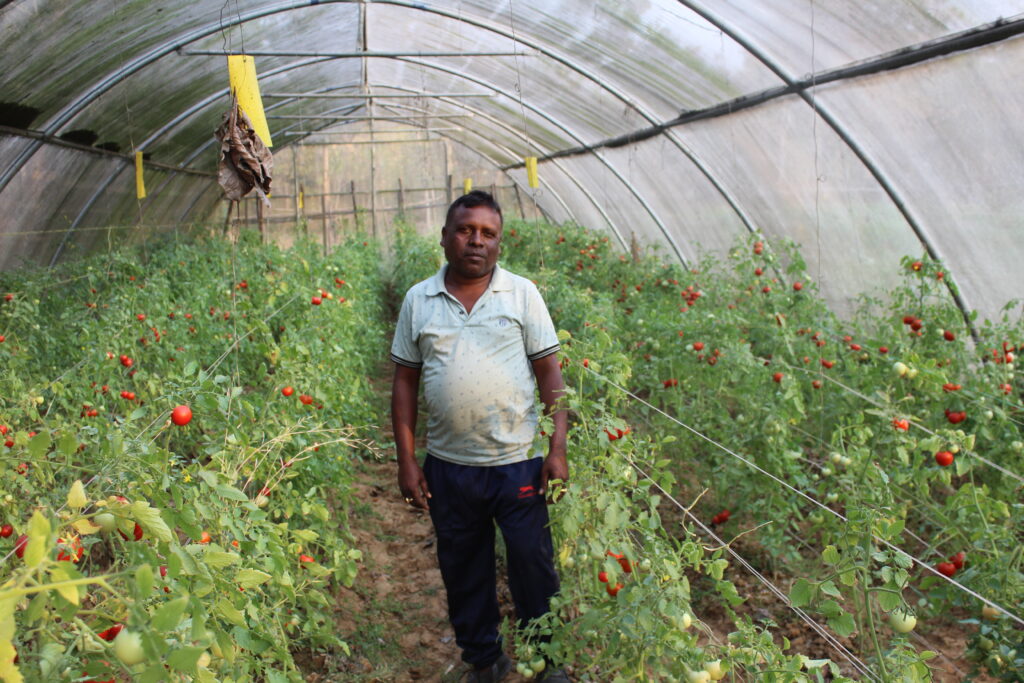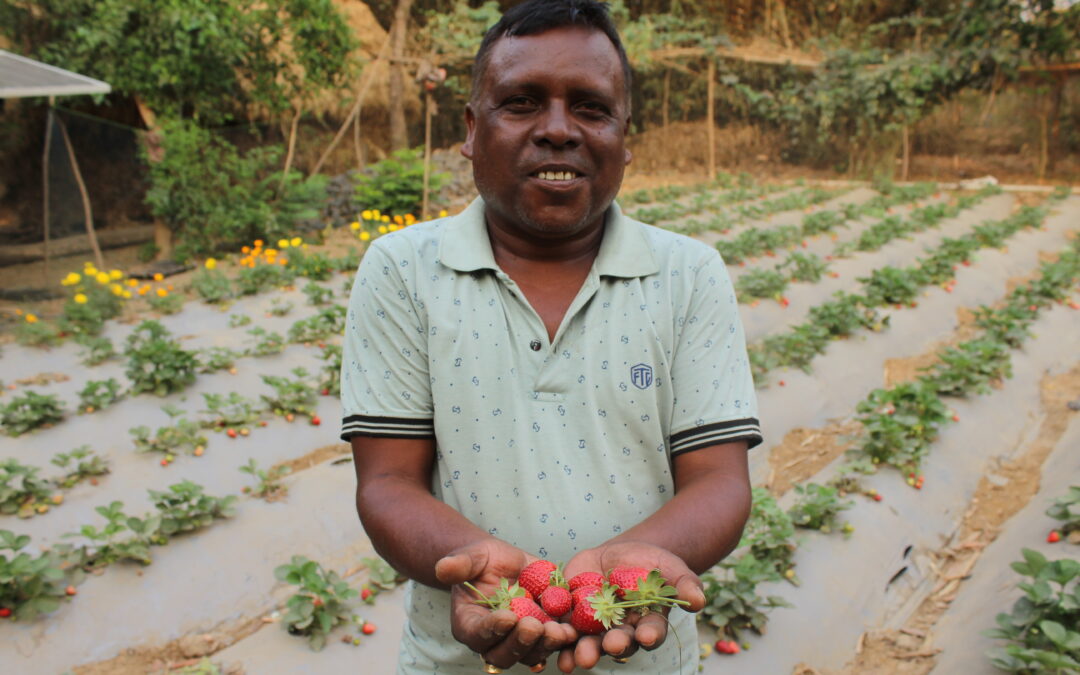In the heart of Jharkhand, a state where agriculture is key livelihood for 80% of the rural population, Baiju Hembram emerges as a symbol of resilience and sustainable agriculture. His transformative journey, spurred by his involvement in the Ajivika Bhoomika Farmers Producer Company Limited (FPO), illuminates the potential of community-led initiatives to address the diverse challenges posed by Jharkhand’s agro-ecological, social, and environmental dynamics. This article delves into the nuanced context, challenges, initiatives, time frames, changes/impact, and the reasons underpinning Baiju’s success. Moreover, it offers comprehensive insights and policy recommendations for stakeholders at various levels, emphasizing the need for sustainable agricultural practices.
Jharkhand, primarily an agrarian state, faces a myriad of challenges that have profound implications for the livelihoods of its rural community. Agriculture serves as the cornerstone of employment and income generation for the majority. However, the state’s challenging agro-ecological landscape, characterized by rugged terrain and environmental vulnerabilities, poses significant hurdles for smallholder farmers like Baiju Hembram. Soil degradation, water scarcity, and economic challenges, such as high input costs and limited access to markets, compound the difficulties faced by farmers in the region. Baiju’s journey becomes emblematic of the need for sustainable alternatives in the face of mounting ecological fragility.

Baiju’s decision to transition from conventional farming methods stemmed from the limitations and environmental repercussions associated with chemical-intensive agriculture. Persistent challenges such as pest infestations, soil loss and degradation, and economic instability prompted Baiju to seek a holistic solution. In a strategic move, Baiju joined Ajivika Bhoomi Ka FPO supported by Bhoomi Ka, an initiative of Welthungerhilfe and Centre for World Solidarity (CWS).
Baiju’s engagement with the Ajivika Bhoomika FPO marked a pivotal turning point in his agricultural practices. Under the Bhoomi-Ka project, Baiju embraced natural farming practices, learned preparation of homemade organic fertilizers and pesticides and their application. The FPO played a crucial role in supporting Baiju, connecting him to local markets, and empowering him with knowledge and resources. The adoption of eco-friendly practices, including the use of jeevamrit, ghanjivamrit, neemastra, and bio decomposers, transformed Baiju’s farming approach, turning his land into a thriving ecosystem.
Baiju embarked on a transformative agricultural journey during the 2019-20 season, achieving remarkable results in a relatively short time. This brief period witnessed the successful integration of sustainable practices, support from Farmer Producer Organizations (FPOs), and the adoption of natural farming methods. The outcomes of this well-coordinated and time-sensitive approach were tangible, demonstrating the efficiency of Baiju’s commitment to agricultural innovation. The transformative process showcased how strategic planning and the implementation of eco-friendly techniques can yield significant improvements in farming practices within a condensed timeframe.
While talking to Baiju and his family it is very clear they are much happier by adopting ecological farming and collaborating with other farmers to market their produce. Mr. Baiju also has understood the chemicals promoted to improve productivity of the soil are in turn responsible for its destruction. He said, “If farmers continue with high chemical farming method, then we will not be able to save soil for our coming generation which is exploitation with our motherland and a big sin according to him.”
His wife Anjali said, “One of the most valuable changes is that soil has become softer and produce shelf life is longer. The inclusion of different crops in their farm has also improved the quality of food and nutrition for their children and family.”
By adopting sustainable and ecological practices and joining the FPO Baiju was able to create a huge transformation to his farm, family as well as the community
Physical Impact: Baiju’s farm witnessed a significant increase in organic matter, thereby enhancing soil structure, fertility and improved water retention capacity. This translated into improved crop resilience and heightened productivity.
Social Impact: Beyond the boundaries of Baiju’s farm, his involvement in the FPO improved not only his economic standing but also empowered his entire family. Baiju’s wife actively participated in farm operations, contributing to a more gender-inclusive and sustainable farming model.
Economic Impact: The transition to chemical-free, low-perishable produce enabled Baiju to command premium prices in local markets, resulting in a substantial increase in income. The FPO has also supported him in connecting with urban markets that provide him higher margins than the local market.
Ecological Impact: The shift towards natural farming practices contributed to environmental conservation by reducing the use of harmful chemicals and fostering biodiversity.
Cultural Impact: Baiju’s success is sowing the seeds of a cultural shift in the community, inspiring neighboring farmers to adopt sustainable practices and reimagine their relationship with the land.

Baiju’s success can be attributed to the harmonious synergy of several factors. The collaborative efforts of the Bhoomi Ka and the Ajivika Bhoomika FPO created a supportive ecosystem for sustainable agriculture. The judicious combination of timely interventions, community empowerment, and the adoption of eco-friendly practices aligned well with the region’s specific needs, ensuring the success of Baiju’s endeavor.
Baiju Hembram’s journey from conventional to sustainable farming, supported by the Ajivika Bhoomika FPO, stands as a testament to the transformative power of community-led initiatives. His success is not merely a personal triumph but a blueprint for policymakers seeking sustainable solutions to the complex challenges faced by smallholder farmers in regions like Jharkhand. As Baiju cultivates a greener, more prosperous future for his family and community, his story becomes an inspiring narrative of resilience, collaboration, and the potential for positive change in agriculture. It serves as a clarion call for stakeholders at all levels to invest in and support sustainable agriculture, ensuring a sustainable and prosperous tomorrow for agricultural communities in Jharkhand and beyond.

